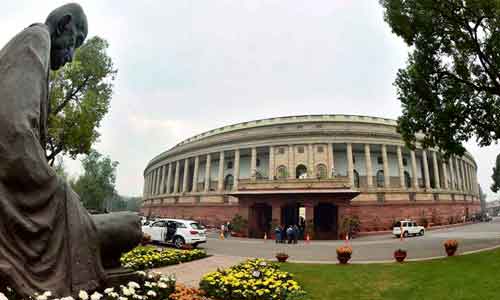People who left for China / Pak will have to forget properties in India - Enemy Property Act to be tabled
The government is set to press for passage of the enemy property bill in the Rajya Sabha when Parliament reconvenes on March 9. The bill seeks to provide ownership of properties worth more than Rs 1 lakh crore.
The law, which has become part of the heated poll rhetoric in Uttar Pradesh, has seen BJP accuse the opposition of shying away from passing a bill intended to ensure that enemy property vests with the government.
Enemy properties are land and assets such as jewellery, shares and bank deposits left behind by persons or firms that chose to go to Pakistan after the Partition and subsequent wars. It includes persons who went to China too.
Opposition parties such as Congress, JD(U), Left and SP have argued that the bill goes against the principle of “natural justice” and discriminates against Indian citizens. The government has said the bill clarifies that the legal heirs of persons who left for Pakistan are not entitled to receive properties that must vest with it.
The “secular” fault lines of the debate have played out in the UP election where all contestants have used polarising tactics. The “enemy property” issue is linked by BJP to “minorityism” on part of the SP, Congress and BSP. Congress has said that the provisions of its bill have been altered.
The largest claimant of enemy property is the Raja of Mahmudabad who, according to the UP government, got the lands after pledging fealty to the British. His successor became a citizen of Pakistan and the Centre has held that those designated “enemies” should not get the property.
The enemy property ordinance was re-promulgated for the fifth time in December last year and came up in the Supreme Court on February 6 with a bench comprising Chief Justice of India J S Khehar and Justice N V Ramana stating that enemy property should not get transferred to descendants of the erstwhile owners.
“It must go to the government, we are very clear about it,” the bench observed. The court advised the petitioner challenging the bill, “Everyone’s right should be protected but you must also be sensitive towards national security.”
Official sources said the argument was whether those who “collaborated” with the British and gained land holdings and then switched loyalties after the Partition should be rewarded.
While India is still engaged in passing a law, Pakistan had taken over its enemy properties within a couple of decades of gaining independence. The background of the enemy property bill lies in the constitution of the office of the custodian of enemy property for India, Mumbai, after passage of the Defence of India Act in 1939. After the 1965 war with Pakistan, substantial properties were vested with the custodian.
The law, which has become part of the heated poll rhetoric in Uttar Pradesh, has seen BJP accuse the opposition of shying away from passing a bill intended to ensure that enemy property vests with the government.
Enemy properties are land and assets such as jewellery, shares and bank deposits left behind by persons or firms that chose to go to Pakistan after the Partition and subsequent wars. It includes persons who went to China too.
Opposition parties such as Congress, JD(U), Left and SP have argued that the bill goes against the principle of “natural justice” and discriminates against Indian citizens. The government has said the bill clarifies that the legal heirs of persons who left for Pakistan are not entitled to receive properties that must vest with it.
The “secular” fault lines of the debate have played out in the UP election where all contestants have used polarising tactics. The “enemy property” issue is linked by BJP to “minorityism” on part of the SP, Congress and BSP. Congress has said that the provisions of its bill have been altered.
The largest claimant of enemy property is the Raja of Mahmudabad who, according to the UP government, got the lands after pledging fealty to the British. His successor became a citizen of Pakistan and the Centre has held that those designated “enemies” should not get the property.
The enemy property ordinance was re-promulgated for the fifth time in December last year and came up in the Supreme Court on February 6 with a bench comprising Chief Justice of India J S Khehar and Justice N V Ramana stating that enemy property should not get transferred to descendants of the erstwhile owners.
“It must go to the government, we are very clear about it,” the bench observed. The court advised the petitioner challenging the bill, “Everyone’s right should be protected but you must also be sensitive towards national security.”
Official sources said the argument was whether those who “collaborated” with the British and gained land holdings and then switched loyalties after the Partition should be rewarded.
While India is still engaged in passing a law, Pakistan had taken over its enemy properties within a couple of decades of gaining independence. The background of the enemy property bill lies in the constitution of the office of the custodian of enemy property for India, Mumbai, after passage of the Defence of India Act in 1939. After the 1965 war with Pakistan, substantial properties were vested with the custodian.




Comments
Post a Comment